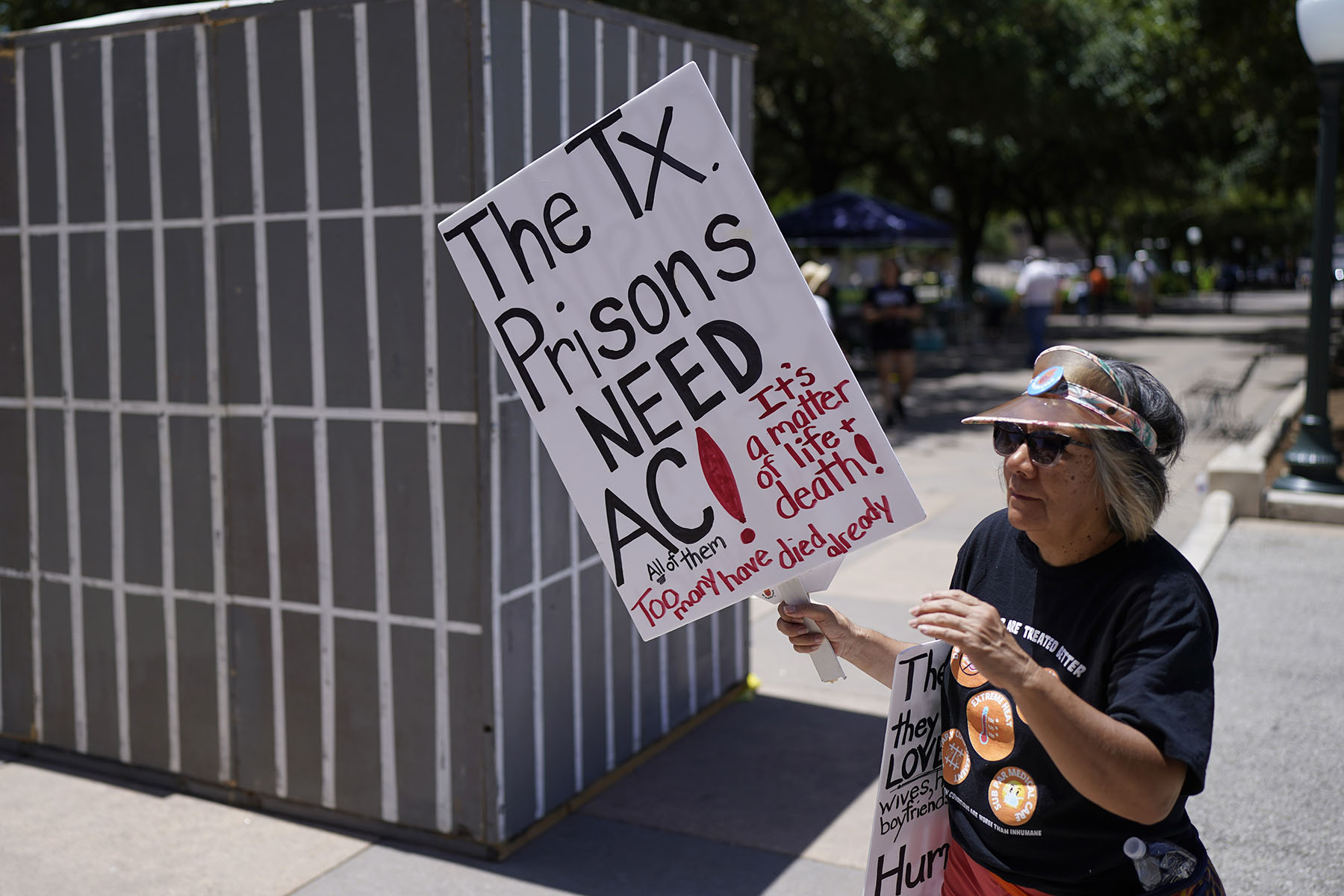Four Texas advocacy groups announced Monday that they’re joining a lawsuit against the state’s Department of Criminal Justice, which they say is failing to address life-threatening temperatures inside its prisons.
The joint lawsuit expands on a complaint filed against the state in August 2023 on behalf of Bernie Tiede, a 65-year-old man with diabetes and high blood pressure, whose health has been affected by the heat, according to the complaint. The groups are calling for the Texas Department of Criminal Justice (TDCJ) to implement a policy that matches the state’s requirement for jails, which mandates temperature control between 65 and 85 degrees.
While high heat and freezing cold affect incarcerated people of all genders, incarcerated women often enter jails and prisons with higher rates of chronic illnesses and mental health concerns. These can all worsen in extreme temperatures. Outside of prisons, women are more likely to provide emotional and financial support to incarcerated loved ones, which can affect their livelihood and well-being.
“When I was incarcerated I personally witnessed my incarcerated sisters and staff faint or fall out from heat-induced seizures. I watched the ambulance come regularly during the summer months picking up ladies. Some of them we never saw again,” said Marci Marie Simmons, a formerly incarcerated woman and the community outreach coordinator for the nonprofit Lioness Justice Impacted Women’s Alliance.
“The fact is, if we don’t get air conditioning in these facilities now, people are going to die this summer.”
Lioness, a network of 700 members affected by the criminal legal system, is one of the organizations suing the TDCJ. In an interview with The 19th seven months ago, Simmons expressed optimism that Lioness and other advocacy organizations had gained national attention last year and built momentum toward addressing prison temperatures. She still maintains that hope, she said, but she has not seen any notable government action on the issue since.
Simmons told The 19th on Monday that by joining the lawsuit there is a risk of retaliation: 300 of Lioness’s members are currently in TDCJ custody. Others are out of prison but surveilled by the parole system, she said. Ultimately, however, Lioness determined that the potential benefits of the lawsuit outweigh the risks, she said.
TDCJ declined to comment on the pending litigation. Currently 31 of the state’s 100 prison units are fully air-conditioned and 55 units are partially air-conditioned.
In September, the department’s Director of Communications Amanda Hernandez wrote in an email to The 19th that the agency “recognizes that some inmates are potentially at a heightened risk of heat-related illnesses because of their age, health conditions, or medications.”
She added that incarcerated people with health conditions may receive an “automated heat sensitivity score that uses information from the inmate’s electronic health record.” Those with heat sensitivity scores receive priority placement for air-conditioned housing, according to TDCJ. Last year the Texas Legislature allocated $85 million to install additional air-conditioning in the state’s prisons.
Incarcerated women are more likely than men to experience “serious psychological distress” that can lead to higher rates of suicide in the heat, according to the federal Bureau of Justice Statistics (BJS).
People with schizophrenia sometimes avoid taking antipsychotic medications that help control their symptoms because the medications make people more vulnerable to heat-related illnesses, Dr. Amite Dominick, president and founder of Texas Prisons Community Advocates, said in the legal complaint against TDCJ.
Additionally, about two-thirds of incarcerated women enter prison or jail with a chronic physical condition. Lisa Bell, a formerly incarcerated woman, told reporters in a news conference Monday that she had to push through the heat while dealing with high blood pressure in prison. She survived, but the heat-related health consequences she experienced inside continue to this day, she said.
“The humidity and the heat causes your heart to beat faster, therefore causing heat stroke, fainting, vomiting and things like that,” said Bell, who is now the board chair for the nonprofit Truth Be Told, which provides trauma-responsive programs for women. “Then once I was released, I still have chronic issues, you can probably hear now, because the medication that I was taking … also does not work well with being in the heat.”
In addition to long-term health challenges, prolonged exposure to high heat also results in death.
The Texas Department of Criminal Justice has not classified a prison death as heat-related since 2012, but Brown University researcher Julie Skarha identified nearly 300 deaths in Texas between 2001 and 2019 that can be attributed to extreme heat exposure.
In June 2023, 37-year-old Elizabeth Hagerty, a woman who had high blood pressure, diabetes and asthma, died in her Texas prison cell that lacked air conditioning in 100-degree weather. In one letter written to Lioness, two incarcerated women said that Hagerty had a sign in her cell window that read, “please give me water” but that she was ignored.
Her mother, Martha Romero, told the Austin Chronicle last year that Hagerty complained about feeling sick and being unable to eat due to the heat. Romero is one of many family members who endures the stress and uncertainty of wondering about the safety of an incarcerated person. An estimated 1 in 4 women has an incarcerated loved one.
“One of the hardest days in my life was the day my husband was sentenced to prison,” Janet Delk, the wife of an incarcerated man, said at the news conference. “He was given a prison sentence, but TDCJ has most assuredly sentenced him to death,” she added, explaining that her husband received medical care twice last summer, one time after he passed out.
In a viral moment in August, Delk testified before the Texas Board of Criminal Justice that her husband and his cellmate had soaked their clothes and bedsheets in toilet water to cool off.
Last summer was the second hottest on record in Texas, and temperatures are expected to rise in future years. Advocates and loved ones say the need for government attention to this issue is critical.
“The temperatures inside Texas prisons aren’t a matter of comfort. This is quite literally a matter of life and death,” Simmons told reporters at the news conference. “TDCJ knowingly houses people in temperatures that put their lives and health at risk.”








